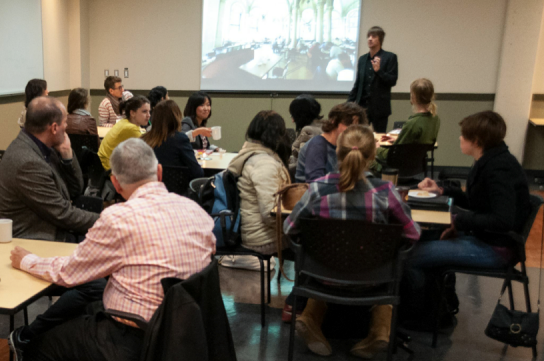By Jessica Wind (The Cascade) – Email
Print Edition: October 31, 2012

Lecture, study, research, cram, repeat – what is the point exactly, if we are all just here to get a job? It probably isn’t the best question to be asking in the fourth year of my degree, but if I wasn’t asking it, then I wouldn’t have learned much. The confidence to ask questions that no one else wants to, and the ammunition to answer them is at the crux of my time at university, but does everyone come away with this arsenal? It feels like, today, the collective mentality is “get in, get the degree, and get out” without much consideration for what we are learning while we are here.
Long forgotten are the days when students would attend a university to have their minds expanded to new ideas and ways of thinking before going on to develop specific vocational skills. Some programs do operate this way. The TEP and PDP programs in this province require a bachelor’s degree before students move on to a specific skill program and practicum. There are stipulations to the path you choose in your degree, but you are still free to concentrate in English literature before moving on to learn how to teach kindergarten – a profession in which, I’m sure, Homer’s Odyssey won’t be a topic of critical contemplation. However, for the rest of us non-would-be-teachers, we expect our degree to be enough.
At the discussion forum, Cafe Philosophique, held on the Abbotsford Campus on October 24, the idea was presented that the present driving force for universities is employability. The government wants to see students coming out of their degree programs and getting into the workforce. This has forced the hand of institutions like ours, to focus its efforts on arming students with job skills. The soft skills—critical thinking, reasoning, problem solving and effective communication to name a few—are increasingly being forgotten about, and the BA is being deemed “the useless degree.”
The secret to a BA is not assuming your only options are to become a philosopher or psychologist, but to understand how to market yourself. Unfortunately, there is no master list of available jobs once you have studied your way through early modern literature. The job market is suddenly very inviting, however, when you realize that critical thinking, reasoning problem solving and effective communication are key to any non-entry level position. Don’t get me wrong, practical programs are useful in getting jobs, but there is opportunity to capitalize on the best of both worlds. Employers are more likely to hire someone with the skills gained in the liberal arts than someone without these courses. Why not take a page out of the TEP program and learn how to do your job after you have learned the soft skills that will make you successful at it?
University, for a long time, was about searching for higher learning. Now, if we aren’t careful, dollars and cents will be the main priority and the better employees that come out with a cap and gown, the higher the profit. So the question remains, are you in university to learn and challenge, or are you here to train and follow right into the workforce?


